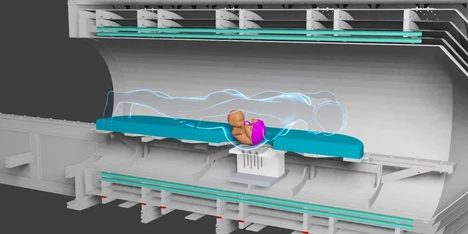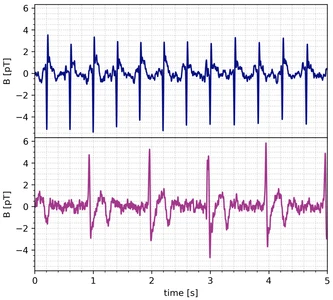Heart Shield
Overview
HeartShield is our collaborative (fetal) magnetocardiography (MCG) platform developed in partnership with the Deutsches Herzzentrum München (DHM) and the Chair of Machine Learning at the CIT (TUM). It comprises a shielded measurement chamber and an array of optically pumped magnetometers, used to record noninvasive cardiac magnetic signals in clinical and research settings.
Patient studies and advanced data processing (signal reconstruction, artifact suppression, machine learning methods) are central to the scientific workflow.
Scientific Motivation
Whereas electrocardiography (ECG) captures the heart’s electrical potentials, magnetocardiography measures the tiny magnetic fields generated by cardiac currents, offering complementary spatial information and sensitivity to deeper or weaker signal components.
In fetal MCG (fMCG), the challenge is even greater: the signals are weaker and more contaminated by maternal and environmental noise.
By combining the cutting-edge HeartShield system with machine learning–based signal processing, we aim to push the boundaries of fetal and adult cardiac magnetophysiology, with potential clinical impact on diagnosis and monitoring of cardiac function.
Methods & Experimental Setup
- The HeartShield apparatus is installed at the DHM; it includes a magnetically shielded enclosure plus an array of optic magnetometers arranged in a grid under a patient bed
- During pregnant patient sessions, both the maternal and fetal heart signals are captured concurrently. The maternal signal is usually stronger and must be separated algorithmically from fetal data
- The data pipeline is closely integrated with the Machine Learning group at CIT, which develops algorithms for:
- adaptive filtering and artifact rejection
- blind-source separation and signal unmixing
- reconstruction of spatially distributed sources by forward modeling
- All hardware control, synchronization, and data acquisition are implemented with emphasis on low noise, time alignment, and modularity to allow extension to new sensors or shielding improvements
Patient Studies & Data Analysis
- Clinical data are collected in collaboration with DHM, adhering to medical ethics and standards; scans include healthy subjects as well as selected patient cohorts.
- The CIT’s machine learning team supports cross-validation, training/validation splits, model explainability, and robustness against noise and artifacts.
- Comparative studies between HeartShield data and established modalities (e.g., ECG, echocardiography) help validate the added value of MCG features.
- Longitudinal measurements can allow tracking of cardiac changes over time, offering insight into disease progression or therapeutic response.
Contact
For collaboration, thesis opportunities, or further inquiries, please contact:
M.Sc. Lena Wunderl
- Tel.: +49 (89) 289 - 53716
- Raum: 5117.02.304
- lena.wunderl@tum.de
Selected Publacations and Theses
- Wurm D, Ewert P, Fierlinger P, Wakai RT, Wallner V, Wunderl L, Wacker-Gußmann A. A Small Scale Optically Pumped Fetal Magnetocardiography System. J Clin Med. 2023 May 10;12(10):3380. doi: 10.3390/jcm12103380. PMID: 37240486; PMCID: PMC10219566.
- Friese, Samuel Clemens. Magnetocardiographic Screening of Adults with Arrhythmogenic Cardiomyopathy - A Machine Learning-Enhanced Approach. Aug. 2025. Bachelor Thesis TUM
People Involved
Partners:
Deutsches Herzzentrum München (DHM): Prof. Dr. med. Annette Wacker-Gußmann (Medical Director)
TUM - Professur für Machine Learning: Prof. Dr.sc. Reinhard Heckel (Data Analysis)
At our Chair:
Currently Involved persons: Lena Wunderl, Philipp Wunderl
Former Members:

